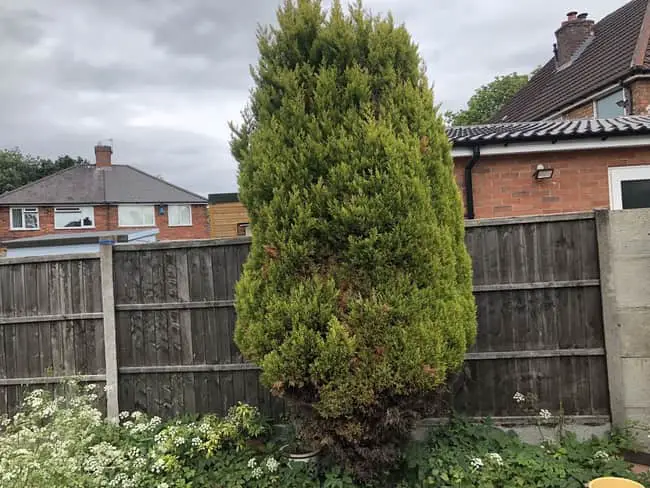This website is supported by its readers. If you click one of my links I may earn a commission. I am also a participant in the Amazon affiliates program and I will also earn a commission from qualified purchases.

Juniper trees are amongst the most popular species of evergreen trees. With over 60 subspecies, it is common to find these trees in many outdoor garden spaces. A common problem I’ve noticed about my Juniper is that it has started to smell like cat pee. This has got me asking: Do Juniper trees smell like cat pee?
Juniper trees should not smell like cat pee. The natural scent of a Juniper tree is either that of a woody cedar or gin. Should your Juniper smell like cat pee, it may be from a bacterial infection, or a cat may have peed near your tree.
So how do you know if a cat has peed near your Juniper tree? And what can you do to stop your Juniper tree from smelling like pee? Keep reading to find out more!
Just a quick heads up, over the past three years of running Plantpaladin, hundreds of people have asked for product recommendations. As such, You can find my favorite indoor bonsai tree here (link takes you to Bonsaiboy), my favorite outdoor bonsai tree (link takes you to Bonsaiboy), or have a look at all the products I recommend here.
Do Juniper trees smell like cat pee?
As many of you know, I recently moved into my first home.
The neighbors were kind enough to leave behind a relatively sizeable 8-foot Juniper tree:

Now that I’ve been out more during the warm summer, I’ve noticed that this Juniper tree has started to smell like cat pee.
Naturally, I’ve been a little startled by this, so I got in touch with a few tree experts, visited my local botanical gardens, and even got in touch with five plant paladin readers asking why my Juniper trees smell like cat pee.
To summarize:
- Healthy Juniper trees grown outdoors should not smell of cat pee, regardless of what sub-species they belong to.
- Most Juniper trees will either have an evergreen scent similar to that of cedar or forest or smell like gin.
- The gin smell will typically become more prevalent when the Juniper berries bloom or in certain species more prominently used for gin.
- Should your Juniper tree smell like pee, it is either because it has a bacterial infection or because cats are using the toilet in or around your Juniper tree.
- Other reasons for your Juniper tree smelling like pee could be due to mistaking your Juniper tree for another tree or having a sewage or drainage gutter near your Juniper tree.
Reasons why your Juniper tree smell like cat pee
So let’s break down why your Juniper tree might smell like Cat pee.
I find that it is mainly due to the following:
- Mistaken identity
- Cat peeing near your tree
- Drainage near your tree
- Bacterial infection
- Recent rainfall
Mistaken identity
So first up, and probably the biggest reason you think your Juniper tree smells like cat pee may be a case of mistaken identity.
You see, most of us do not just have Junipers in our back yards but several trees and plants.
If you are smelling cat pee, it is likely caused by another tree.
Some tree species in particular that are notorious for smelling like cat pee include Boxwood, Valerian, and Viburnum Tinus.
Viburnum Tinus, in particular, is an evergreen shrub, so it can easily be mistaken for a Juniper tree.
Cat peeing near your tree
So I discovered my Juniper tree smelled like pee simply because a neighborhood cat was peeing near my tree.
One of my neighbor’s cats would regularly visit my garden as many pet cats patrol their neighborhoods.
It was only till I stopped to think about it and track the smell over a few days that I realized that the cat was using my Juniper tree to relive itself.
Cats will not pee near where they eat, so it was a case of feeding at my house and then relieving themselves at mine!
If you notice a lot of cats in and around your garden or where you keep your Juniper, there is a strong chance cats are peeing in your Juniper tree.
Drainage near your tree
Many older homes typically have hidden drains and gutters that link directly into sewers.
As such, it can sometimes be the smell from these gutters that can sometimes emphasize the smell of cat pee.
In these situations, regularly cleaning out guttering and ensuring stagnant water does not build up in these areas should prevent the smell from becoming too much.
Bacterial Infection
While this is more common in Chinese Elm trees, Junipers too can become attacked with bacterial infections that can cause excess sap to leak from the tree.
As the pressure builds inside the tree, eventually, the pressure pushes out the sap, which can sometimes lead to a bad smell.
Mold infections caused by fungi in the soil can also cause a foul smell, so be sure to regularly change your potting soil once per year to prevent bacterial and mold infections from becoming too prevalent.
Recent rainfall
The last reason why your Juniper tree might smell like cat pee is due to recent rainfall.
Excess rainfall can cause damp and mold infections and root rot.
In some instances can cause your tree to smell like cat pee.
Alternatively, rainfall causes grit, dirt, and pee to travel, so if your neighbors have cats, it might be a case of the rain transporting cat pee in and around your Juniper tree.
If you find that your Juniper smells more like cat pee just after rainfall, this is most likely why.
How to stop Juniper trees from smelling like cat pee
So if your Juniper tree is persistently smelling like cat pee, what are some quick tips you can do to prevent this going forward?
To summerise:
Feed nearby cats
If you find that cats frequent your garden and pee on your Juniper, then one of the best things you can do is feed these cats.
Cats hate eating where they pee, so by getting them used to your area by feeding them; they will look elsewhere to relieve themselves.
Plant lavender
Now if you don’t want to encourage cats to eat in your garden, there are alternative methods.
First I recommend planting lavender.
Cats do not like lavender and so doing so will repel them from your backyard.
Using brewed coffee grounds in your soil mix will also give your soil a potent smell which should prevent cats from wanting to come near your tree.
Remove any mold infections
As mentioned, mold infections are another primary reason why your Juniper tree might smell like pee.
If this is the case, use a suitable fungicide to prevent your soil from infecting fungal spores.
I would also repot your Juniper in the late summer to prevent the mold infection from coming.
Ensure that too much water does not build up in the potting soil by investing in a good potting soil mix and only watering your Juniper when the topsoil is dry to touch.
Mask the smell
If the above two methods don’t work, then the next step is to try and mask the smell.
Super absorbent powders such as baking soda work well to neutralize any foul smells.
Consider mixing one cup of peroxide with three tablespoons of baking soda and one teaspoon of liquid soap.
Mix and pour in a spray bottle in and around your Juniper tree.
Not only will this remove the smell, but it may also remove any pests or insects that may be adding to the smell.
Alternatively, if you want a natural solution, use orange, lemon, or lime peels and place them in and around the soil.
Citrus peel then will help neutralize the smell.
Plant nice smelling flowers
Finally, consider planting nice-smelling flowers in and around your tree.
These flowers will also mask the smell of your Juniper tree if it smells like pee and should prevent it from being noticeable.
Just be sure to do this in unison with feeding nearby cats and maintaining good soil, or else you may find the pee smell moving to your other plants.
Some good flowers/trees to plant include:
- Roses
- Lillys
- Lavender
- Ceder
- Lilac
What do Juniper trees typically smell like?
Juniper trees should smell like woody cedar trees. Depending on the species, they should have a fresh evergreen smell or neutral smell. Juniper trees with larger berries may also smell like gin, as the berries from Juniper trees are used in gin.
Do Juniper trees smell like cat pee – Survey
Finally, I asked five Plant Paladin readers who own Juniper trees if their Juniper tree smells like cat pee – here are the results:

Many of your readers are also in the process of growing their Juniper trees.
If this is the case with you, hopefully, the tables and posts below should help:
Pros of keeping Juniper | Cons of keeping Juniper |
Leaves don’t fall off | Older species can cost a lot |
Cold-resistant | A lot of sap |
Heat and drought resistant | Hard to prune |
Multiple sub-species | Can’t be kept indoors |
Can be kept outdoors year-round | Can get disease |
Make for excellent bonsai | Pest infestation |
Great for use in shrubs and hedges | Can be messy with their berries |
Long Life | Pets can choke on their tips |
Apple bonsai tree requirements | Explained |
Water | 3 times per week in the spring and summer. Once to twice per week in the winter. |
Sunlight | 4 hours of direct sunlight per day. |
Temperature | 14 to 85 degrees Fahrenheit |
Fertilizer | once per month in the spring and summer - avoid in fall and winter. |
Repotting | Once every 2 to 3 years |
Placement | Outdoors only |
Species Type | Coniferous |
Wire type | Both copper and aluminum |
Time to grow from seed | 3 years |
Potting Soil | Inorganic mix of akadama and volcanic ash rock. Organic soil such as peat soil can also be used. |
Growth type | Medium growth - adds 5 to 12 inches per year in height. |
Size | Medium to large, most trees sold is typically two hand bonsai. |
Lifespan | 500 years + |
- Pros and cons of Juniper trees
- Can Juniper survive winter?
- Juniper bonsai temperature range
- Do Bonsai trees smell?
My top picks for the gear you will need!
So like I mentioned earlier, over the past three years of running PlantPaladin, hundreds of people have asked me for my recommendations on the best bonsai gear on the market.
Having spent thousands of dollars on bonsai items these past few years and tested at least 100 bonsai-specific products, I’ve listed my favorite products below – All of which I highly recommend and think you can get great value.
They can purchase directly by clicking the link to take them to Amazon.
Bonsai Tool Set: One of the significant challenges I’ve had is finding a toolset that was not only durable but didn’t break the bank. SOLIGT has recently developed a fantastic bonsai tool set that covers all the tools you need to trim, prune, and repot your trees. – You can grab it here.
Complete Bonsai Set: Many of you will want to grow your bonsai trees entirely from scratch, but finding the varicose seeds, pots, and other items in one place can be challenging. Leaves and Sole then have created a complete bonsai set that I’ve personally used that ticks all the boxes. You can grab it here.
Bonsai wire: The number of times I’ve run out of wire for my bonsai or purchased cheap bonsai wire that doesn’t do the job is embarrassing for me to admit. After a lot of trial and error, I found that using Hotop’s aluminum bonsai wire is one of the best options on the market. This can easily be used for both indoor and outdoor bonsai. You can grab it here.
This post was written by Fehed Nicass who has been passionate about bonsai for over 3 years. He currently resides in the UK and works in sales.

